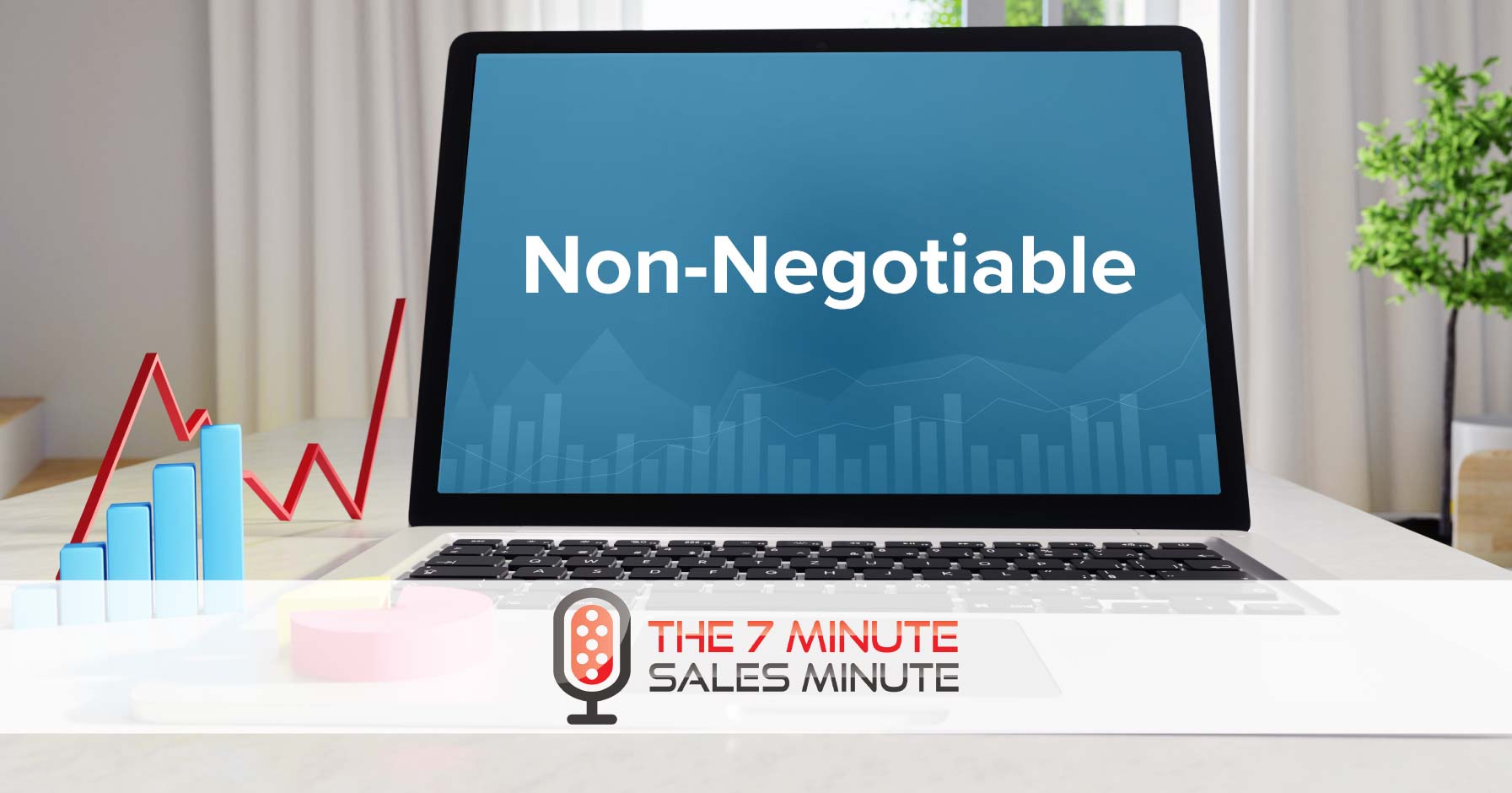
Hosts: Jon Dwoskin & Scott Fishman.
Read the transcript
Thank you for joining us for another episode of The Seven Minute Salesman podcast. Your bite-sized and easy-to-digest guide to jump-starting your sales career, and putting you on the road to gaining more prospects, more clients, more business and, ultimately, more income.
Jon Dwoskin: Scott, I have an idea for this week for our listeners. Let’s give all of our listeners a raise to make more money.
Scott Fishman: I like it.
Jon Dwoskin: Yeah. I think we can show people a way this week to give everybody a 12, 13% raise. What do you think about that?
Scott Fishman: I think if someone gave me a 12 to 13% raise, I would be ecstatic. But, I’m skeptical, Jon. I don’t think we can actually do it.
Jon Dwoskin: I think we can do it. I think we should call it the 25-hour workday.
Scott Fishman: Okay.
Jon Dwoskin: When I talk to clients, and I know same with you around the country, you ask them what two things would you like? They always want to make more money and have more time.
Scott Fishman: Right.
Jon Dwoskin: Nobody has it. We all have 24 hours in a day, so let’s give our viewers, and our listeners, a 25-hour workday so they can find some extra time to be more effective.
Scott Fishman: Yeah, they say time’s a great equalizer, but still I’m not really understanding. My watch has 12 hours on it. It goes through twice a day, so how are we going to make a 25-hour workday?
Jon Dwoskin: Mine, too. Well, why don’t we start with breaking down what somebody makes on an hourly basis. I think that’s the biggest mistake. I don’t think anybody really pays attention to, “What do I make on an hourly basis? Here’s what I make. How many hours a week do I work? What’s my hourly rate?” Why don’t we say … Let’s talk to the person who is making whatever. You can use this calculation for whatever, but $300,000 a year.
Scott Fishman: Okay, perfect.
Jon Dwoskin: Fair? Okay. For everybody listening, if you’re making more, if you’re making less, the calculation is very simple. You take, in this example, $300,000. You divide it by 52 weeks, and then you divide it by 40, assuming a 40-hour work week.
Scott Fishman: Easy enough.
Jon Dwoskin: That comes to $144 and some change, but we’ll say $144 an hour. That is a $300,000 person is making $144 an hour.
Scott Fishman: Jon, what’s minimum wage? I don’t even know these days.
Jon Dwoskin: I don’t think it matters for our viewers.
Scott Fishman: No, not at all, but that’s literally the average … I think it’s $12 an hour or something like that.
Jon Dwoskin: Yeah.
Scott Fishman: That’s 12 times minimum wage, so that’s just a thought.
Jon Dwoskin: When it comes to what’s important about knowing what you make per hour is you’ve got to start figuring out what you don’t want to do, and what you shouldn’t be doing, which is anything under that rate.
Scott Fishman: Okay. Sounds-
Jon Dwoskin: What do you think about that, Fish?
Scott Fishman: I think that makes perfect sense, and going back and circling a little bit back … when you said 12 to 13% raise, what I’m thinking about is how much I’m going to be making over a year for that extra hour.
Jon Dwoskin: Right.
Scott Fishman: [crosstalk 00:03:04]. That’s unbelievable.
Jon Dwoskin: If what we talked about today, you get an extra hour out of your day, and you multiply that appropriately, that’s an extra $37,500 a year.
Scott Fishman: Holy cow.
Jon Dwoskin: There you go. Let’s tell our listeners how do you find an hour in the day.
Scott Fishman: Okay, that makes sense.
Jon Dwoskin: How do you find an hour in the day?
Scott Fishman: I think first and foremost, if I know I’m making $144 an hour, what I’m thinking is what am I doing on a daily basis that isn’t worth $144 an hour? I’m going to find someone else to do that work.
Jon Dwoskin: Right. I think a really good exercise for that is … and you’ll find this on our website … coming up with an analysis to figure out what you do as you work in your business versus working on your business. Working on your business are focusing on the one or two unique things that you are uniquely good at that’s valued at $144, or close to it, per hour. Working in your business are all the minutiae things that you do that you should be delegating, so now the question is are you delegating, or do you have the appropriate team to delegate that stuff to?
Scott Fishman: Right. That makes perfect sense. Again, if I can find someone to do the job cheaper, than what I would be sacrificing to do that job, it definitely is something we should be looking at. Something we should be doing.
Jon Dwoskin: The reason we’re talking to that $300,000 listener today is because you have the funds to get an executive assistant. To get proper staff to grow your business. I mean, that’s what we all want to do, right? Grow our business.
Scott Fishman: Right.
Jon Dwoskin: You don’t want to get stuck … Scott and I always see this with a lot of the people that we work with. Their passion becomes their prison and they get stuck at that same number of dollars that they’re making each year and they can’t grow their company because they’re working too much in it.
Scott Fishman: Right.
Jon Dwoskin: They’ve got to work on it and build that support team. A takeaway for everyone is you’ve got to – and I know you’ve thought about this – you’ve got to hire an Executive Assistant. And, if you’re overwhelmed and have an Executive Assistant, you need to hire another Executive Assistant – or the appropriate administrative staff – to delegate anything under $144 an hour.
Scott Fishman: Right. Something I think about, and you hit the nail on the head when you said working in the business versus on the business, because I can’t tell you how many times I’ve stopped at my desk and logged in to my computer and all the sudden I can’t get out. I’m trapped. You said your passion becomes your prison and that’s exactly what happens. You get an email that throws you off track, and all the sudden you’re completely doing something that is not paying you. You’re working on something that is more of a support staff nature, but you just get stuck doing it because you think you can do it faster, you can do it better.
Jon Dwoskin: Right. Especially during prime business hours where you throw your whole game off. So, what’s the solution for that?
Scott Fishman: Delegating, number 1. But, also deciding what’s urgent and what’s important. If something’s urgent, it has to happen right now. It’s a fire that needs to be put out. If not, the whole business is going to burn down (but very rarely does that actually happen). If it’s just important, we can get back to them by the end of the business day.
Jon Dwoskin: Right, and just to follow up on that, I think this is absolutely critical. Everybody thinks that every email that they get is urgent. I mean, down to silly things from their friends, or who wants to grab lunch today, or everybody’s meeting up at 3:00 for a drink. Whatever it is, I don’t know, but everybody’s got to take stock that every email is not urgent. Maybe 5 to 10% are urgent and need an immediate response from your key clients or prospects, but 90% can be done after 4:00 or before 9:00am. After your prime business hours, clean it up. Tell your client- … Your clients are expecting you to get back to them by the end of the day. This microwave mentality that everything has to be done within moments is costing people a lot of money.
Scott Fishman: Right. We’re high-level salespeople. Again, we’re talking about making hundreds of thousands of dollars. We’re not working at some electronics store and making $10, $11, $12 an hour selling TVs or computers, or whatever. We’re high level salespeople here and we want to be treated as such, so we have to act as such. If there’s a restaurant that comes to town and you can’t get a table, what happens? Everyone wants to go, so it builds that fervor. You don’t want to be the restaurant where you can just walk in and you can get a table instantly, and you can smell the dirty mop water because nothing’s cooking in the back of the kitchen. You want to be the restaurant where it’s the place to be. So, if we get back to someone ten seconds after they send us an email, what does that say about us? What are we doing with our time?
Jon Dwoskin: Right. Since we’re not busy, we’re waiting around to do $10 an hour work.
Scott Fishman: Exactly. So, act like you’re making $144 an hour even if you aren’t yet. It’s important.
Jon Dwoskin: It’s important, and within that $144 … we talked about this a little earlier … is what you’re uniquely great at. You need to figure out the one or two things that you’re uniquely great at, and delegate everything else. That’s when you’re in your zone. That’s when you’re in your stride, and that’s where you love to be. That’s the place to be. That’s the place that money is made and growth occurs.
Scott Fishman: I think to sum up a little bit about what we talked about, we need to plan our days accordingly. We need to make sure that we’re not getting sucked in to the minutiae that we can let someone else handle.
Jon Dwoskin: Right.
Scott Fishman: If someone else can handle it 80% as well as we can handle it, let them deal with it because that’s their job. Our job is to work on the business.
Jon Dwoskin: You’ve got to hire those people. Don’t be afraid to invest in your business and hire those people so you can grow your business.
Scott Fishman: Correct. Email can wait. Some emails can wait. If it’s super-urgent, where you have to get back to it right away … everything else, put it off to the side and handle it later. You don’t need to get back to somebody right away. You don’t need to deal with everything all the time. Tim Farris actually talks about batching email, and only checking it certain times of the day. I think that works very well. There’s no reason you have to have your email, or your Outlook, or your Gmail sitting on your desktop all day long just pinging you, and calling your name. Saying, “Jon, check me. Jon! Jon! Jon!”
Jon Dwoskin: Right. Distracting you. I’ve read all of his books, and I know you have as well. And, he makes a lot of really good points and I agree. You’ve got to control it, not let it control you.
Scott Fishman: All right. Again, figure out what your hourly rate is, and if it’s a task that literally can be handled by somebody else, let them handle it. [crosstalk 00:09:27]
Jon Dwoskin: You’ve got to relinquish the control. Let it go.
Scott Fishman: Exactly.
Jon Dwoskin: I’m going to end with one thing, because I think right now these are some very fundamental tips. But, the key is you’ve got to do it. You’ve got to take action, so I’m going to ask everybody this riddle. I just want you to think about the answer, or write it down.
Five frogs are sitting on a log, Scott.
Scott Fishman: Yes.
Jon Dwoskin: Four frogs decide to jump off the log. How many frogs are left on the log? Don’t answer, Scott, because you already know the answer. But, I’m going to ask all the listeners. I’ll say it again.
Five frogs are sitting on a log. Four frogs decide to jump off. How many frogs are left on the log? I’m going to give you a second to think about it. Think about what your answer is. If you answered 1, you’re wrong. The answer is 5 because they just decided. They didn’t take action, so with everything that we talk about in these quick, seven- minute, fluff-free, Seven Minute Sales Minute, it’s you’ve got to take action in order for it to work.
Scott Fishman: Thank you very much.
Jon Dwoskin: Have a great day.
Thank you for listening to this episode of The Seven Minute Sales Minute. For show notes, and worksheets, pertaining to this week’s show, check us out at the sevenminutesalesminute.com. Take today’s strategies and run with them. Increase your sales and increase your income.




